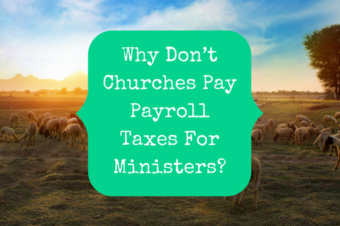
Tax season is just around the corner and that means I’m about to be inundated with tax-related questions. Today, I’m going to try to get ahead of the game and start answering the questions before you ask them. Up first, when is a pastor an employee or self-employed?
Pastors Are Always Self-Employed For Social Security Taxes
We’ll start with the easy part. When it comes to Social Security and Medicare taxes, also known as payroll taxes, you are always considered self-employed. Pastors are always self-employed for Social Security taxes and pay under the SECA system. You have no choice in the matter and there is no debate. You’re always considered self-employed. You can read more about why and what that looks like here.
When A Pastor Is Self-Employed For Federal Income Taxes
Because pastors are always taxed as if they are self-employed for Social Security purposes, that brings a lot of confusion into the income tax side of things. If I work at a church but pay payroll taxes as if I’m self-employed, does that mean I’m considered self-employed for everything else? What’s the difference? Why is this so confusing?
Most pastors, though self-employed for Social Security, are still common law employees for income tax purposes. If you work for a church that tells you what to do and how to do it, you are an employee. I know, it’s confusing to be told you’re two different things, but that’s the way it works. It’s called dual-status taxation.
Some pastors truly are self-employed, though. Think of a traveling evangelist or someone else whose ministry is not tied to nor directed by a specific church. You see, for the IRS, employment status all comes down to control. Is someone else controlling your methods and your results? Then you’re an employee.
The US Tax Court has developed a 7-factor test to determine when a pastor really is self-employed for federal income tax purposes. Here are the seven factors that they look at:
- How much control the employer exercises over the details of the work
- Who invests in the work facilities
- The pastor’s opportunity for profit or loss
- Whether or not the employer has the right to fire the pastor
- Whether the work is part of the employer’s regular business
- How permanent the relationship is
- The relationship that both parties believe they are creating
This is what they look at to see who is in control of the relationship. Based on these seven factors, most pastors are employees. At least for the work they do for their churches.
Can A Pastor Be Both An Employee And Self-Employed?
Even if you’re a common-law employee of your church, you may still be self-employed at times. What about when you perform a wedding for a friend and they give you $100? Your church didn’t give you the money. They didn’t tell you to perform the wedding. They might not even know you did it!
Clearly, in that case, you were not acting as an employee of your church. You were acting as a self-employed person. Just like a lot of workers have self-employment side-gigs outside of their normal jobs, when you perform ministerial services outside of your church you are acting as a self-employed person. These could be things like performing weddings or funerals or guest speaking engagements. They are services performed outside of your church where others are paying you for them.
Let me summarize it for you:
All of your income is taxed as a self-employed person for Social Security and Medicare taxes.
Your church income is taxed as employee income for income taxes.
Your side income from outside of the church is taxed as self-employed income for income taxes.
Employee income is reported to you on Form W-2 and self-employment income is reported to you on Form 1099. If it’s something like $100 that an individual gave you for a wedding, they aren’t going to report it at all and it’s your responsibility to track it. To learn more about how these different types of income are taxed, read this article.
I hope that helps clarify things for you at least a little bit. Let me know if you have any other questions!




2 Responses
Jairos Nyirenda
January 25, 2020Am a Pastor,I would like to say this is a good program for us.